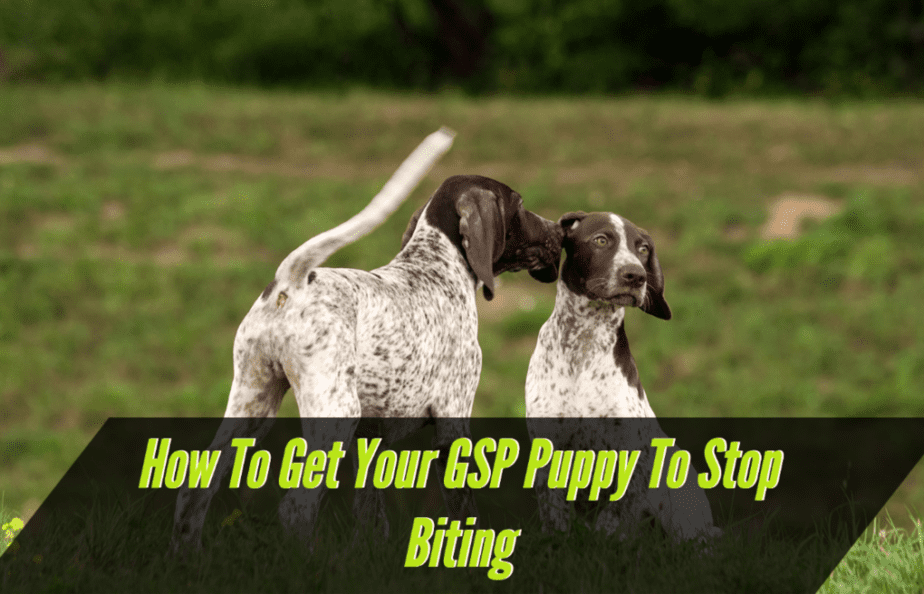German Shorthaired Pointer (GSP) puppies are loyal, friendly, and intelligent. They’re splendid companions for you and your family.
What if your puppy is play-biting too much to the point that it’s starting to irritate or concern you, though? What should you do about it?
Don’t worry! In this article, we show you how to get a GSP puppy to stop biting. Stick around.

Is It Normal for GSP Puppies to Bite?
Yes, it’s totally normal for GSP dogs at this young age to bite. However, you shouldn’t neglect such behavior from your puppy and rustle up to solve it.
Your GSP puppy’s behavior is based on a number of factors, including heredity, environment, psychological conditions, training, and socialization.
Let’s break down each one of these factors for more insight.
Heredity
Your puppy’s temperament mainly comes from its ancestors.
The heritage of GSP comes from hunting dogs, which is why GSP dogs are well-known for their hunting skills.
The thing is, with great hunting skills comes aggressive behavior, which could explain why GSP puppies like to bite.
Training
Training your dog starts from when it’s very young. With that said, the training your dog receives from the pet shop affects its temperament.
If your dog used to bite others when it was in the shop or with a previous owner, it can be a little difficult for you to overcome this issue.
Training is extremely important for dogs. If you don’t take serious action regarding your pooch’s biting attitude, you won’t be able to stop it from doing so in the long run.
Environment
Your house environment highly affects your puppy’s attitude. Your GPS pup will try to adapt to his new environment and pack by engaging in behaviors that resemble said environment.
So if your home is chaotic and loud, your furry friend will probably develop aggression. On the other hand, if your house environment is calm, your GSP will be quiet and well-tamed.
Socialization
Dogs are naturally sociable. They enjoy being in a group and they’re influenced by their group. That said, if your furry friend’s peers enjoy play-biting and nipping, your pooch will copy them.
So you should supervise your puppy when it’s around other dogs to see how they act together. You also need to expose your GSP to many people and animals to socialize him.
Psychological Conditions
Your puppy can be play-biting because of some psychological disturbances. If your GPS is hurt, frightened, or threatened, it’ll bite. This can also happen when your furry friend encounters new people or animals without having been properly socialized.
How to Get GSP Puppy to Stop Biting
When you first bring a puppy home, you teach it where the food, sleeping bed, and litter box are. The next step you should take is teaching it how to behave.
If you’re annoyed because of your little GSP’s biting, here are some tips to help you:
Identify the Cause
The first step to solving any problem is spotting the cause. As stated previously, there are quite a few reasons that can make your puppy start to play-bite.
You should pay attention to your dog’s body language, as well as his physical and psychological condition, to be able to identify the cause of the problem.
Identifying the trigger or the cause of your furry friend’s strange behaviors will provide you with the insight you need to fix the problem.
Assert Dominance
When your GSP understands you’re his master, his aggression will be reduced. He’ll realize that you have the upper hand and won’t dare bite you.
So, the first thing you need to do is teach your puppy the five core commands: come, sit, stay, heel, and down.
To master these orders and learn more about them, you can check this article.
Consult Your Vet
If your puppy keeps on biting repeatedly, you need to consult your vet.
Your German Shorthaired Pointer might have developed aggressive behaviors because of some medical conditions.
Your furry friend might have ear infections, dental problems, or urinary tract infections. Diseases like these are painful and might be the reason for your dog’s irritating biting attitude.
If your GPS is healthy and still bites, your vet can advise as to how to deal with the situation.
Train Your Dog By Yourself
If you’re a do-it-yourself type of person, here are some training rules you can follow:
First, accommodate your little GSP to your existence. Try to be around it during feeding time. When your puppy gets used to your presence, it’ll rarely bite you.
Secondly, give your dog treats frequently to establish that you’re friends, not enemies.
Thirdly, talk to your GSP puppy while he’s eating. You can try hand-feeding him and patting him on the head while doing so.
After applying these tips, if the problem persists, consider the following points:
- Gently pinch your GSP’s nose and upper canines hard, saying it out loud.
- Lift your dog from the nape of the neck, shake it gently, and command to stop.
- Use water or corrector sprays whenever your puppy bites you. Apply eye contact with him and shout a stop command.
If you still encounter a biting problem, contact your breeder. They’ll tell you exactly how to deal with the situation.
Although the previous solutions sometimes work, I don’t recommend you handle the situation on your own. Consult a specialist to strike at the root of the problem. This brings us to the next tip.
Get Help From Professionals
Sometimes, aggressive behaviors can be resolved by medication. Contact your vet and they’ll give you suitable medication according to your puppy’s condition.
Some behaviorists advise using choke or prong collars, but such methods are a bit inhumane, which is why we don’t recommend them.
Wrapping Up
The issue of biting in GSP puppies isn’t new or abnormal. We know it’s hard for you to deal with such behavior on a daily basis, but if you follow the above-mentioned tips, you should be able to resolve the problem.
The last thing we’d like to say is that you should never blame yourself! You can’t solve anything by blaming yourself. Biting is normal behavior for dogs, especially young ones.
If you go through the article, you’ll understand that this issue isn’t related to you, the dog owner. It’s all about your GSP puppy’s attitude and condition.

